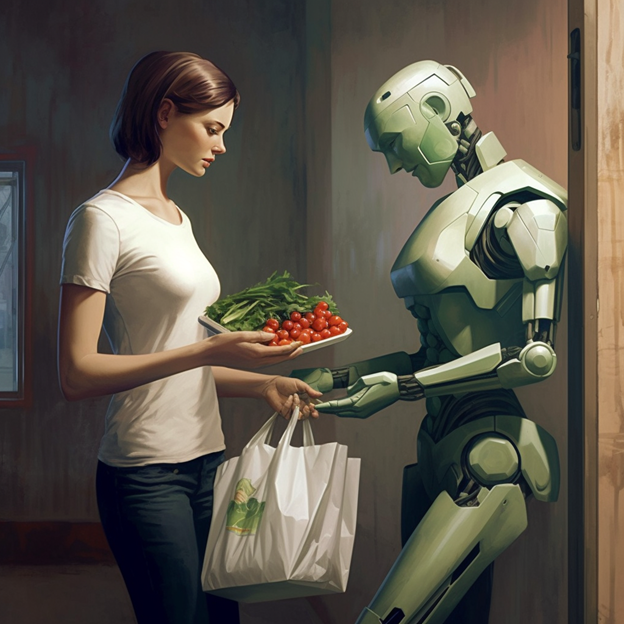Medtech
Are You Next? Artificial Intelligence Takes 326 Million Jobs
Step into the year 2030, where the latest advancements are reshaping the way we live and work. Unemployment just hit a low for the year at 33%. Picture…

Step into the year 2030, where the latest advancements are reshaping the way we live and work.
Unemployment just hit a low for the year at 33%.
Picture a single mother entering what appears to be a grocery store only to find herself greeted by a robot. Without even glancing at the contents, the robot hands her the grocery bag.

How is this possible?
The store already knew what she needed weeks in advance, pulled together the merchandise and charged her card. Facial recognition identified her from down the street.
This isn’t some dystopian novel.
This is our future.
By now, you’ve probably heard about ChatGPT and the artificial intelligence (AI) revolution. It’s often hailed as the great job killer.
But what does that truly mean?
Let’s take a closer look at the numbers.
- Finances Online estimates automation will kill 85 million jobs worldwide by 2025.
- Forbes estimates the United States will lose 73 million jobs by 2030.
- Worldwide automation will replace as many as 236 million jobs by 2030.
Of course, there will be new jobs created in this transformative era.
However, expecting an entire workforce to be retrained swiftly enough to match the pace of change is unrealistic.
We’ve already witnessed the ripple effects through equity markets, where stocks like Microsoft soar and competitors like Google find themselves struggling to keep up.
A lot of naysayers poopoo the hype. It’s nothing more than hysteria, they say. After all, the McKinsey report released in 2018 never came to fruition.
The timing could certainly be off.
Then again, it might not be.
Yet, amidst the skepticism and dismissive attitudes, there are individuals like George Gilder who prove that foresight is a powerful tool.
George, the renowned author of the Technology Report, possesses unparalleled insight.
Years ago, he warned the Reagan Administration about microprocessors’ imminent rise and significance. In the blink of an eye, computers dominated the landscape, transforming industries and humanity forever.
In 1994, George made another striking prediction — a mobile device capable of communication and computing wherever you go. Thirteen years later, the iPhone revolutionized the world.
Time and time again, George defied conventional beliefs. He understood that technology evolves in ways we never expect, reshaping our lives in both grand and subtle ways.
You see, while many believe that AI is solely about tackling complex problems and envision robots running the world, the truth is simpler and smaller.
Programs like ChatGPT empower individuals to become programmers without needing to write a single line of code.
Imagine wanting to build a device and software to monitor the ocean tides or seeking to modify a cheesecake recipe to incorporate exotic ingredients. With ChatGPT, these possibilities become within reach for the average person.
When Google entered our lives, it revolutionized how we accessed information.
ChatGPT and similar programs are poised to redefine how we interact with information, making knowledge more accessible and interactive than ever before.
We don’t have to imagine Star Trek-esque technologies to see the applications.
These are but a few examples of AI in use today you probably didn’t realize:
- Farming: Yep, farmers use AI to improve crop yield, pest control, soil health and irrigation through analysis and predictive analytics. Geneticists use AI to develop better seeds. Gardeners even use it to plan their spaces.
- AI Bees: That insect you just swatted could have been a robotic bee operated by AI as a way to help plant pollination.
- Burger Flipper: Miso Robotics developed an AI robot to flip burgers.
There are also applications you’d expect, like oil and gas companies using AI to locate better energy reserves, or, as we’re sure you’ve experienced, customer service chatbots.
Now, we understand that not everyone has programming skills or the desire to navigate volatile tech stock movements.
That’s precisely why George Gilder is a beacon of hope for the Eagle family.
His entrepreneurial mindset, combined with common-sense investing, has yielded incredible success over the years.
In the 1990s, he was revered as one of the top stock-pickers.
George possesses a unique ability to survey the technology landscape and identify the investable opportunities that lie within.
His guidance helps everyday folks invest with confidence in industries that will change the world.
That’s why NOW is the time to act.
Click Here to Access a Special Offer for George Gilder’s Technology Report!
The post Are You Next? Artificial Intelligence Takes 326 Million Jobs appeared first on Stock Investor.

ETF Talk: AI is ‘Big Generator’
Second nature comes alive Even if you close your eyes We exist through this strange device — Yes, “Big Generator” Artificial intelligence (AI) has…
Apple gets an appeals court win for its Apple Watch
Apple has at least a couple more weeks before it has to worry about another sales ban.
Federal court blocks ban on Apple Watches after Apple appeal
A federal appeals court has temporarily blocked a sweeping import ban on Apple’s latest smartwatches while the patent dispute winds its way through…














